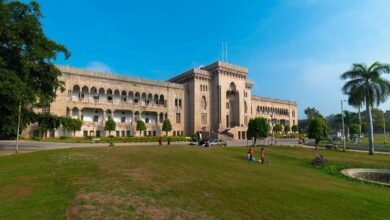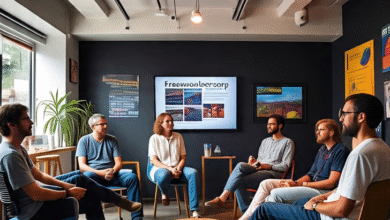Yolande knell nationality: Nationality and Career Profile

Yolande Knell is a prominent journalist known for her extensive work with the British Broadcasting Corporation (BBC), particularly in the Middle East. Her nationality, professional journey, and insightful reporting have made her a recognizable figure in international journalism. This article explores Knell’s nationality, her background, and her contributions to global media, providing a comprehensive overview of her life and career.
Nationality and Early Life
Yolande Knell is British. Born in the United Kingdom, she holds British citizenship, which has shaped her perspective as a journalist working for one of the world’s most respected news organizations, the BBC. While specific details about her birth date and early childhood are not widely publicized, Knell’s British nationality is evident through her affiliation with the BBC, a quintessentially British institution, and her professional base in the UK before taking on international assignments.
Growing up in the UK, Knell was exposed to a media landscape that emphasized rigorous journalism and global awareness. Her education likely played a significant role in preparing her for a career in international reporting. Although precise information about her academic background is limited, it is known that many BBC journalists of her caliber often pursue degrees in journalism, politics, or international relations. Knell’s fluency in English and her ability to navigate complex geopolitical issues suggest a strong educational foundation, possibly at a British university.
Her British nationality has also influenced her approach to journalism, as the UK’s media culture values impartiality, in-depth analysis, and a commitment to public service broadcasting. These principles are evident in Knell’s reporting, which often balances multiple perspectives while maintaining clarity and objectivity.
Career Beginnings
Yolande Knell’s career in journalism began with her work at the BBC, where she quickly established herself as a capable reporter. The BBC, funded by the British public through a license fee, is known for its global reach and commitment to factual reporting. Knell’s early assignments likely involved covering domestic stories in the UK, but her career trajectory soon took her to some of the world’s most challenging and dynamic regions.
Her move to international journalism reflects the BBC’s tradition of deploying talented reporters to cover global events. Knell’s British nationality provided her with a passport to work in various countries, facilitated by the UK’s diplomatic relations and the BBC’s extensive network of correspondents. Her ability to adapt to different cultural and political environments underscores her versatility as a journalist.
Middle East Correspondent
Knell is best known for her work as a BBC correspondent in the Middle East, a region marked by complex political dynamics, ongoing conflicts, and rich cultural histories. Based in Jerusalem for much of her career, she has covered stories across Israel, the occupied Palestinian territories, and neighboring countries. Her reporting has provided audiences with nuanced insights into one of the world’s most contentious regions.
As a British journalist, Knell brings an outsider’s perspective to the Middle East, which allows her to approach stories with a degree of detachment while remaining empathetic to the human experiences she documents. Her nationality has likely helped her navigate the region’s diplomatic landscape, as the UK maintains significant ties with both Israel and Arab states. However, it also places her in a challenging position, as British foreign policy in the Middle East—historically tied to events like the Balfour Declaration and the Iraq War—can influence how she is perceived by local sources and audiences.
Knell’s coverage has spanned a wide range of topics, including the Israeli-Palestinian conflict, the Arab Spring, and the rise of extremist groups. Her reports often combine on-the-ground observations with historical context, reflecting her deep understanding of the region. For example, she has reported on the daily lives of Palestinians in Gaza, the political developments in Israel, and the broader implications of regional conflicts for global security.
Her work in the Middle East has not been without risks. Journalists in conflict zones face physical dangers, political pressures, and ethical dilemmas. Knell’s ability to operate in such environments highlights her professionalism and courage. Her British nationality, while providing some institutional support through the BBC, also places her in a unique position as a foreign correspondent, where she must navigate local sensitivities while upholding the BBC’s editorial standards.
Notable Reporting
Yolande Knell’s reporting stands out for its clarity, empathy, and attention to detail. Some of her most notable work includes her coverage of the 2011 Arab Spring, which saw uprisings across the Middle East and North Africa. From Egypt to Libya, Knell reported on the hopes and challenges of protesters seeking political change. Her dispatches captured the energy of Tahrir Square in Cairo and the chaos of post-Gaddafi Libya, offering British and global audiences a front-row seat to historic events.
Another significant aspect of her work is her reporting on the Israeli-Palestinian conflict. Knell has covered major events such as the 2014 Gaza War, the 2018 U.S. embassy move to Jerusalem, and ongoing settlement expansions in the West Bank. Her reports often highlight the human cost of the conflict, featuring interviews with ordinary people—both Israelis and Palestinians—whose lives are shaped by political decisions. This human-centered approach aligns with the BBC’s mission to inform and educate, and it reflects Knell’s skill in making complex issues accessible to a broad audience.
Knell has also explored cultural and social stories, providing a more holistic view of the Middle East. For instance, she has reported on women’s rights in Saudi Arabia, youth movements in Jordan, and the preservation of historical sites in Iraq. These stories showcase her ability to move beyond breaking news and delve into the region’s cultural fabric, offering a counterbalance to the often conflict-driven narratives.
Challenges as a Foreign Correspondent
As a British journalist working abroad, Knell faces unique challenges. The Middle East is a region where foreign reporters are often viewed with skepticism, particularly by those who associate Western media with political agendas. Knell’s nationality ties her to the UK’s historical and current role in the region, which can complicate her interactions with sources. For example, the UK’s colonial legacy and its support for certain policies may lead to distrust among some communities.
Moreover, the BBC’s commitment to impartiality can be tested in polarized environments. Knell’s reporting on the Israeli-Palestinian conflict, for instance, often attracts criticism from both pro-Israel and pro-Palestinian groups, who may perceive her coverage as biased. Her ability to maintain objectivity while acknowledging the emotional weight of the stories she covers is a testament to her journalistic integrity.
Physical safety is another concern. The Middle East has been a dangerous region for journalists, with risks ranging from crossfire in conflict zones to targeted attacks. Knell’s work requires her to balance the pursuit of truth with personal safety, a challenge that all foreign correspondents face but one that is particularly acute in her beat.
Impact and Recognition
Yolande Knell’s work has had a significant impact on public understanding of the Middle East. Through her radio, television, and online reports, she has brought distant stories to British and global audiences, fostering greater awareness of complex issues. Her ability to explain intricate political developments in clear, relatable terms has made her a trusted voice in international journalism.
While specific awards or accolades for Knell are not widely documented, her long tenure with the BBC and her prominent role as a Middle East correspondent suggest a high level of professional respect. The BBC’s decision to place her in such a high-profile and demanding role indicates confidence in her abilities, and her reports are frequently featured across the organization’s platforms.
Her work also contributes to the broader mission of the BBC as a public service broadcaster. By providing balanced, in-depth coverage, Knell helps fulfill the BBC’s mandate to inform, educate, and entertain. Her British nationality aligns her with this mission, as the BBC’s values are deeply rooted in the UK’s media tradition.
Personal Life and Public Persona
Details about Yolande Knell’s personal life are scarce, as she maintains a low profile outside her professional work. This discretion is common among journalists, particularly those covering sensitive regions, where personal visibility can attract unwanted attention. It is known that she is based in Jerusalem for much of her work, and her deep knowledge of the region suggests a long-term commitment to understanding its complexities.
Knell’s public persona is that of a dedicated, empathetic, and professional journalist. Her on-air presence—whether on BBC Radio 4, BBC World News, or online platforms—is characterized by a calm, authoritative tone. She avoids sensationalism, focusing instead on the substance of the stories she covers. This approach has earned her credibility among audiences and peers alike.
Nationality in Context
Yolande Knell’s British nationality is more than a legal status; it is a lens through which her work can be understood. The UK’s global influence, its history in the Middle East, and its media culture all shape her role as a correspondent. At the same time, her ability to transcend national identity and connect with diverse communities reflects the universal qualities of good journalism: curiosity, empathy, and a commitment to truth.
Her nationality also ties her to the BBC’s legacy as a global news leader. The BBC’s international reputation provides Knell with a platform to reach millions, but it also comes with expectations of excellence and impartiality. Knell has met these expectations through her rigorous reporting and her ability to navigate the complexities of the Middle East.
Conclusion
Yolande Knell is a British journalist whose nationality and professional journey have shaped her into one of the BBC’s most respected correspondents. Her work in the Middle East has illuminated some of the world’s most pressing issues, from conflict and politics to culture and human rights. Through her reporting, she embodies the values of British journalism—objectivity, depth, and public service—while bringing a global perspective to her audience.
As a foreign correspondent, Knell faces challenges that test her resilience and ethics, yet her contributions continue to inform and inspire. Her British nationality, while a defining aspect of her identity, is just one part of a career defined by dedication to storytelling and a commitment to understanding the world. Yolande Knell’s work reminds us of the power of journalism to bridge divides and foster dialogue, making her a vital voice in today’s media landscape.



